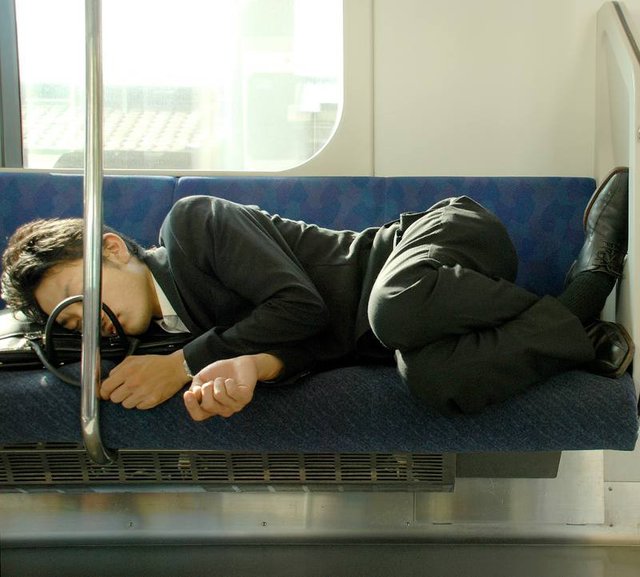
*Overworked Japenese man sleeping in the train
Source:https://www.flickr.com/photos/jannem/22329391/
PEOPLE the world over know that the Japanese work hard. In many cases, this is all people know about them. Generally, the Japanese have not revealed to the world what they are really like.
There is, however, nothing mysterious about the Japanese or their industriousness. Japan would not be where she is today were it not for the diligence of her people. Would you like to understand them better?
High Educational Standards
In Japan a person’s future is greatly affected by the school from which he graduates. Certain companies choose workers from only one or two universities, and, naturally, most parents would like to see their children enter a good one. Of course, universities can accommodate only a limited number of students, and these are selected by means of tough entrance examinations. This strictness in scholastic standards backs up all the way to primary school. A student who does not study hard there will find it impossible to catch up later. Hence, students are under pressure from an early age.
As the young scholar climbs the academic ladder, the pressure increases and leisure time decreases. Eventually, he may study until 11 or 12 at night, and before exams he may not even bother to go to bed. After school hours many children take private lessons in mathematics, English or in whatever subject their parents feel they need help.
Attention to Details
Throughout his school years, a student develops a sense of priorities as to personal desires and life’s realities. He finds that nothing can be accomplished without hard work. This is the hardworking Japanese in the making.
He also learns to pay attention to details. This quality is especially developed as he learns to write. In the first year he will learn 76 of the Chinese characters that are used in Japanese writing. These are very detailed. Each sign is made up of a number of strokes and these must be written in a certain order. Missing a stroke means missing a mark!

Japenese students in the examination Hall
Source:
You may feel that 76 characters in the first year is not too hard. But, in addition, the student has to learn the two other Japanese writing systems—the hiragana and the katakana—in his first year. Each of these systems has 50 characters. The number of new characters introduced increases each year until the student knows the 2,000 or so that will enable him to read the newspaper.
Morning Exercise
All around the world, people hop, skip, jump or jog. In Japan they do calisthenics. Fifty years ago a set of exercises began to be broadcast daily over the Japanese radio. It was continued through the war years and is still very popular. You can switch on your radio anywhere in Japan at 6:17 in the morning and hear the familiar piano accompaniment for 10 minutes of exercise.
Many companies have recorded the music from the radio and play it over the office or factory loudspeakers before or after the starting bell. Thus everyone, from the president down, can improve his blood circulation before settling down to the day’s work.
Students are encouraged to get up early and exercise even during the summer holidays. A car park or other convenient plot of land is chosen where they—and any neighbors who wish to join them—can gather at 6:17, switch on the radio and exercise together. This early start helps students to get through the pile of homework assigned for the holidays.
Group Consciousness
Compulsory education starts at age six, but many parents put their children in kindergarten for two years before this. Thus the children quickly get into group activities. Children in primary school assemble at a fixed time and place and walk to school in small groups behind the one chosen as leader. Noon meals provided at school further help toward group orientation.
The pattern of learning and the style of doing things vary little from one end of the country to the other. This is helpful, since many families move around as companies transfer their workers from one branch to another. Children learn that they must be adaptable, and they try to fit in quickly with a new group.

Japenese office workers asleep on a train
Source:https://www.flickr.com/photos/amirjina/2286401799/
The emphasis on the group as opposed to individualism does not mean that personal ambition is forbidden. Ambition, if anything, is encouraged. But ambitions are realized through orthodox methods recognized by the group.
A Japanese, once he enters the employ of a company, expects to be there for life. His loyalty is taken for granted. The company’s survival is his survival. Hence, he is expected to put it before everything, even his family. Quitting one job and finding a better one is very rare in Japan. Quitters are considered unreliable. If the worker is not willing to throw in his lot with the company, he is not wanted.
However, once in the company, if he is loyal, he is cared for. Everything possible is done to keep him on the payroll, even during difficult periods of depression. When a worker’s skills become outmoded due to technological advances, the company will teach him new ones. There are regular company outings and generous bonuses. There may be company housing for the married and dormitories for the single. Many companies have lodges and other facilities at famous hot-spring resorts.
The company may provide lessons in English and other cultural subjects, pay for various kinds of entertainment and provide other fringe benefits. As he gets older, the employee’s position improves and his salary increases. He feels secure as a member of a permanent working group. He knows the company will look after him.
Days On and Days Off
Mainly out of concern for their image abroad, many large firms have adopted the five-day workweek. Others give two Saturdays off. Some small businesses keep going seven days a week, but, generally speaking, Sunday is regarded as a day off.

The Japenese work tirelessly and fast like the leopard
Source:https://www.flickr.com/photos/aisforangie/28997419/
Actually, if workers took advantage of all legal time off, including annual vacations and national holidays, they could have from 80 to 130 free days a year. But most of them do not take nearly that much time off.
Japanese workers talk about “service overtime.” In many cases they work late into the night or over the weekend, for no extra pay. When they are busy, they keep working until they reach a stage in the job that allows them conscientiously to quit and go home. Many families never know at what time Daddy will be home, and they are quite used to his working on Sunday.
In fact, due to lack of space, relaxing at home may be difficult for the workingman. In the morning the bedding is folded and put away, transforming the bedroom into a living room. “Sleeping in” under these circumstances is not easy. The children usually get up early and the room is needed for the day’s activities. A man may have a choice between being in the way at home and going out to spend money on entertainment. Often, it is less trouble just to go to work as usual!
Besides, in summer the small house may feel extremely hot compared with the office, which is usually air-conditioned. And in winter, too, the heated office may be more comfortable.
Personal Hygiene
The famous Japanese bath—a daily, or almost daily, affair—is about as important to the workingman as eating and sleeping. To try it yourself, you will need a tub of rather hot water in which you can soak up to your chin. The Western-style bath is not the same, since you must be able to wash outside the bath.
First, rinse your body, then get into the tub and soak for about 10 minutes. Next, get out, give yourself a good soaping and a good massage with your washcloth. Rinse all the soap off and get back into the tub. As the minutes tick by, you will feel your muscles relaxing and you will begin to wonder why you never did this before.
When you get into bed you will feel comfortable and warm and sleep soundly. Next day, you will get up feeling like a new person—in fact, like a Japanese. Once you get used to it, you will see why this kind of bathing is so important to the hardworking Japanese.
Hygiene might be considered a side effect of bathing. A well-washed body contributes to a pleasant atmosphere, a feeling of well-being, and shows consideration for others.
Industrious in All Things
A Japanese works hard, not only at his employment, but even at recreation. For example, imagine that he wants to learn to ski. First, he will buy all the equipment: skis, ski boots, special waterproof clothing, gloves, hat, goggles—everything. Then he will make short trips to some famous ski resort as often as his time and finances allow.

This is very serious, he is tired sleeping on the floor in a train.
https:// soranews24 .com
To get the most out of a weekend, he may travel overnight on Friday, ski hard all day Saturday and Sunday and then travel back overnight to get to work on time Monday morning. On Monday he will be tired, stiff—but satisfied.
Does their life pattern appeal to you? Well, some of it may and some of it may not. Nevertheless, likely you agree there is much that can be learned from the hardworking Japanese.
Thanks for reading my post and hope you would kindly comment, upvote and follow me for more.
